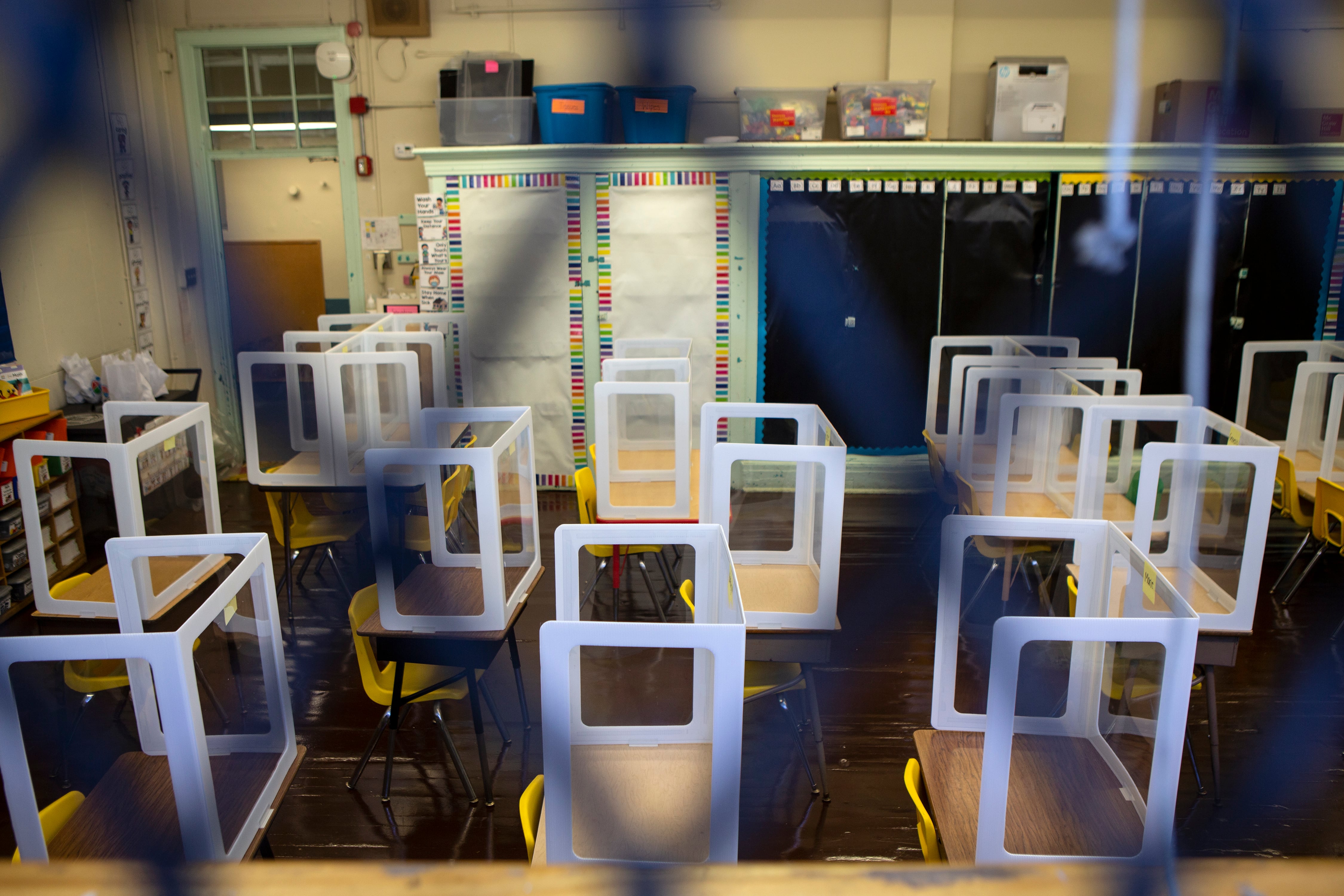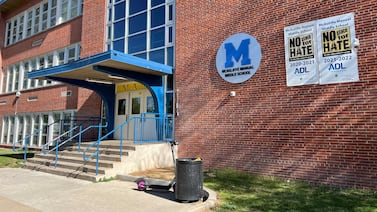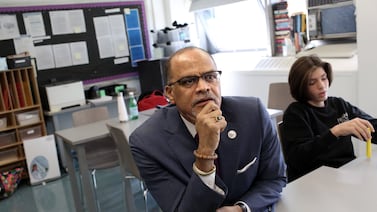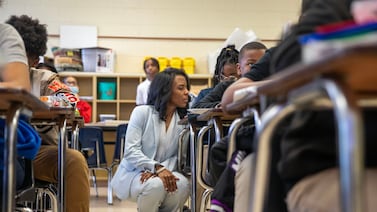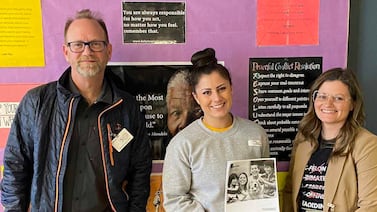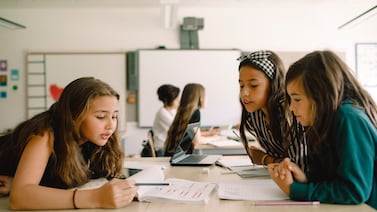With five Philadelphia public schools and part of a high school shut down due to the pandemic barely two weeks into the school year, parents are struggling to understand the policies for closures and quarantines and growing increasingly concerned over whether the COVID mitigation protocols are enough to keep their children safe.
Some parents said they are not getting accurate information. For example, specifics about who tested positive for COVID-19 are not shared due to privacy concerns.
And parents expressed frustration that the district’s online dashboard that tracks the numbers of tests and positive cases runs at least a week behind.
Stefanie Marrero, who has four children attending district schools, considered putting them in the new virtual academy but decided against it when she learned they would lose their spots in the neighborhood school and would not be getting real-time lessons from teachers.
“That made me decide, they need to be in person and I’ll just deal with it,” she said.
Medical privacy rules prevent the school or district from sharing who tested positive. Now, letters to parents only notify the parent of a positive test.
“We need a transparent system for us to get information from the schools ensuring that our children are not being taught by people that are testing positive for COVID-19,” she said.
Now, the guidance calls for a school to close if there are six cases within a two-week period. A single classroom or grade might be quarantined if there are three cases — a “cluster” as defined by the Centers for Disease Control and Prevention.
James Garrow, spokesperson for the Philadelphia Department of Public Health, said that the policy is continually under review. Quarantine and closure decisions are made by the city’s health department, not the district or an individual charter.
“We are absolutely monitoring the situation and expect to change the guidance as we learn more,” Garrow said. Factors to consider include parental feedback and learning more about how COVID spreads in schools, he said.
Three of the district schools that have closed are elementary schools in which most of the students are ineligible for vaccination.
Emlen is a 300-student pre-K-5 school in Mount Airy, and Richmond is a 450-student K-5 school in Port Richmond. Charter schools that closed, Lindley Academy and Pan American Academy, are both 750-student K-8 schools.
On Thursday the city’s health department also shut down Southwark School, which has 900 students in grades K-8, and the Ninth Grade Academy at Roxborough High School. Only freshmen at Roxborough will switch to virtual learning for 10 days. Students in 10th, 11th and 12th grades will continue attending in person, according to an announcement on the school’s website.
Garrow said that even if three students who test positive in the same grade are in different classrooms, that is still considered a cluster.
The assumption is that students in the same grade “eat lunch together, have recess together, come together at some point in the day,” he said.
Citing privacy, the district does not release any details on who is infected, only saying it is a student or a staff member, in letters sent home to parents. But anyone who has come into close contact, within three feet for more than 15 minutes, with a person who tested positive is notified. Only symptomatic students are tested regularly, except for some athletes and students who participate in activities like band and choir.
That means that parents may not be notified if someone in their child’s classroom is infected if that student’s desk is located across the room or, if it’s a teacher or teacher’s aide and the child sits far from the front of the classroom. The students who are informed are “those sitting directly around them,” Garrow said.
However, in early grades, determining who is a close contact is not so simple because many classrooms have been rearranged so children can work together at tables, and teachers and aides move around to work with small groups, sometimes for extended periods. In light of how easily the delta variant spreads, district officials are discussing whether to limit some practices that put students in small groups, according to one person with knowledge of the situation who did not want to be named.
Philadelphia schools range from a few hundred students to a few thousand. Some buildings are crowded, making it harder to social distance, while others were built for much larger student enrollments than they currently house, making it easier to spread out students. All these issues are taken into consideration, Garrow said.
Online, some parents have asked why the guidance is six cases rather than a percentage of enrollment, given the wide disparity in school size. “We’re constantly reviewing these things,” Garrow said.
Central High School, for example, has 2,400 students and Northeast has 3,400. Closing the entire school for six cases might seem excessive. Other factors that could come into play under a new guidance might include the rate of spread in the surrounding community.
The school district has decided to test only symptomatic students, putting it at odds with the teachers union, which wants all students tested regularly in “screening testing.” Garrow said one reason is a strain on testing materials.
“If we test everybody, we could crash the whole system, and folks who are experiencing symptoms may not be able to get tested,” he said. CDC guidance says “screening testing” can be one mitigation strategy along with others including masking, good ventilation, and social distancing.
Another policy that some districts use is “test to stay,” which means that those who have been exposed to someone who tests positive are tested daily rather than forced to quarantine. Philadelphia has paused that strategy now, said Garrow.
“The disease spreads so easily, and there is still so much [spread] in the community, we’re worried that a person could test negative for two days, and then test positive, and spread it during that time,” he said.
One policy not being considered, Garrow said, is a permanent return to all-virtual or hybrid learning. Last year, even though the school district stayed all-virtual until March, that was not the recommendation of former health commissioner Dr. Thomas Farley. Many private and Catholic schools offered in-person learning for much of the year.
“At the time, Dr. Farley felt that in-person learning could be conducted safely if safety measures were properly followed,” Garrow said. “This year, with the addition of staff and older student vaccinations to the existing safety protocols, there are no discussions on making that type of recommendation at this time.”
Parents have been left trying to figure out what to do next. Getting notifications from the district, student testing, and quarantining top the list of concerns from families who have spoken to Chalkbeat.
Danielle Brown-Waters, who has two children at Saul and Roxborough high schools, told Chalkbeat that she signed a document to have her children tested. “But I don’t know if the testing is done randomly or done when they come in or weekly, I don’t know.”
Aileen Callaghan, parent of a second grader at Richmond Elementary School, which was temporarily shut down Wednesday and set to reopen Sept. 25, said, “We are not getting any information about what classroom is getting infected or what grade is at risk of infection.” She believes every child should be tested.
Richmond parents are organizing an event from 6:30 to 8:30 p.m. Sept. 22 at the Cohocksink Recreation Center, 2901 Cedar St., to discuss plans for a safe return to school, scheduled for Sept. 25.
It would help if communication was more clear, Callaghan said.
“One thing specifically that I would really appreciate is a quick message from the school saying, ‘We at this point have notified all people of which children have been at risk for exposure to COVID-19 due to the most recent outbreak. If you have not received a notification at this time, your child is not at risk,’” she said. “That would do so much to take a whole level of stress off me.”


